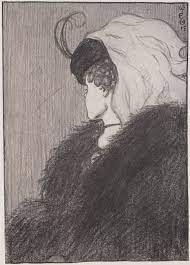What is your bias?
Did you know that we tend to see what we expect to see, instead of what is actually there.
Or, we can see a portion of what is there and make it the big picture instead of the small view that it really is.
That is our bias.
It is our cognitive bias, the bias that dictates how we respond and behave.
And here’s the thing … it can be different for each one of us.
 Have you ever been shown this picture? What do you see first?
Have you ever been shown this picture? What do you see first?
The trick with this picture is that depending on your “lens” you will see a women, and if you look at it longer, or if someone else shows you, you will see a whole other woman in the photo.
If you look one way you will see an elderly woman, and if you look another way you will see a young woman.
Can you see them both?
Our cognitive bias is a pattern we have developed, that is not based on reality, and it dictates how we respond and behave to things in our life.
Think about the way two people can hear the same thing, but have two completely different interpretations. The difference in interpretation is their cognitive bias.
Our bias usually comes from our past and what we have experienced.
Think about someone who grew up with a critical parent who always expected more. They most likely see an authority figure in their life as critical, even when they are being helpful (response is not based on reality but on their cognitive bias). Not only do they probably start feeling tension whenever they begin to discuss anything, but will respond to them out of that tension. Instead of being open to growth they most likely become defensive and argumentative, or even shut down in the discussion.
Someone who has grown up with a supportive and encouraging parent may be much more open to constructive criticism and take it through the lens of growth and a desire to learn.
But someone who has grown up with lack of conflict and a parent who desires to please instead of setting boundaries may shut down in any situation or discussion that involves any conflict.
Even if reading these examples you may have trouble identifying your cognitive bias because it is just that, a bias. If we could identify and see it, it wouldn’t be a bias.
I have a business acquaintance that is so busy trying to convince others (but probably mostly herself) that she is wildly successful, that she doesn’t give anyone else the opportunity to tell her. She filters her business actions through that bias and ends up offending or demeaning people without being fully aware of it. Her bias stems from not feeling worthy in her early years, and it impacts how she responds and behaves.
It is so important to be able to step back and understand your perspective and bias. Not only will it give you the mindset you use but you can’t shift or grow through something you don’t see.
Take a look at these two pictures and notice what you see.


What do you see when you first look at the picture?
The city skyline?
The water?
The CN tower?
How about the second picture? What do you see first? Still the city skyline or now the people in the picture?
My relational side of me will pick right up on the couple and dog in the second picture and think about the experience of being on the water on such a sunny day, enjoying the view of the city.
I have a cognitive bias of not tolerating lies and I take that to an extreme in a situation that has inauthenticity. I will react in my “spitfire” mode when being told something that I feel is illogical and simply people pleasing.
Here’s the thing … if I don’t know my bias, it is more likely to block my progress to being who I want to be.
To say, “O, that’s just me” is not good enough if you want to show up as your best. Unless, that is who you want to be.
But if you want to show up better, or the best you can be, you need to know your bias and shift it to reality.
So back to the question, what is your bias?
Can you identify why you respond the way you do and is it who you want to be?
Today my husband pointed out something he noticed I do in a conversation. He said I tend to finish sentences or jump into the middle of a story with a story about me. Ouch. I hate it when other people do that. I told him he has full authorization to let me know when I do that because it is not how I want to respond.
But if I wasn’t aware of it, I wouldn’t change it.
Is there a cognitive bias that is behind how you respond and behave, and is it the way you want to respond or behave?
It begins with our awareness, and we grow in clarity and confidence when we begin to take the steps towards being who we want to be.
How does your cognitive bias block your path to being your best?
Awareness brings us to clarity, and clarity builds the confidence to boldly live who we want to be.
